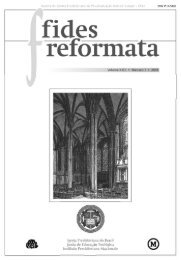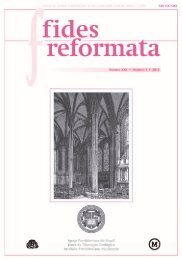Fides 22 N2
Um publicação do Centro Presbiteriano de Pós-graduação Andrew Jumper.
Um publicação do Centro Presbiteriano de Pós-graduação Andrew Jumper.
You also want an ePaper? Increase the reach of your titles
YUMPU automatically turns print PDFs into web optimized ePapers that Google loves.
ELIAS MEDEIROS, THE REFORMERS AND MISSIONS<br />
three theological factors: their interpretation of Matthew 28:20, the doctrine of<br />
predestination, and the apocalypticism, 73 especially of Martin Luther. For each<br />
of these theological arguments, Kane offers no substantial documentation. Nor<br />
does he consider different positions, interpretations, and applications among<br />
Luther and Calvin and other reformers. He also takes two quotes he uses – one<br />
from Calvin and the other from Luther – out of context without giving necessary<br />
explanations about the sense in which both Calvin and Luther use them.<br />
Kane quotes Calvin without documenting the source and without exegeting<br />
Calvin’s sentence. 74 Without making any distinction between Luther’s<br />
and Calvin’s eschatology, Kane tries to justify such apocalypticism during<br />
the Reformation by writing, “In his Table Talks he [Luther] wrote: ‘Another<br />
hundred years and all will be over. God’s Word will disappear for want of any<br />
to preach it.” 75 With no reference to Luther’s specific document and no explanation<br />
of what Luther meant by “another hundred years and all will be over,”<br />
Kane assumes that Luther’s statement represented the view of all the reformers<br />
and the Protestant churches during the Reformation period.<br />
The second factor presented by Kane has to do with the context in which<br />
the Protestant churches found themselves between 1517 and 1650. A minority<br />
in Europe, they were confronting the Counter Reformation launched by the<br />
Roman Catholic Church, suffering the consequences of the Thirty Years’ War,<br />
and fighting among themselves – Lutherans versus Calvinists – over doctrines.<br />
According to Kane, their survival mood may excuse them “for having neither<br />
the vision nor the vigor necessary for world evangelization” 76 and the “internecine<br />
warfare” among themselves impeded them from doing “a better job with<br />
evangelism at home and missions overseas.” 77 Kane’s critique seems to assume<br />
that fighting for purity of doctrine is not important. Kane also assumes that their<br />
concern for the evangelization of Roman Catholics throughout Europe was not<br />
part of world evangelization, and that “evangelism” and “missions” are two<br />
different categories of work. The assumed distinction between “evangelism”<br />
and mission is not biblical, but is imposed based on “mission strategy.”<br />
Kane’s third reason why the reformers had “neither the vision nor the vigor<br />
necessary for world evangelization” has to do with Protestant Europe being<br />
isolated “from the mission lands of Asia, Africa, and the New World.” 78 Asia,<br />
73 Kane takes apocalypticism in its basic meaning as the belief that the end of the world is eminent.<br />
For a more detailed historical explanation on the origin and meaning of the term, see David E. Aune,<br />
The New Testament in Its Literary Environment (Cambridge: James Clarke and Co, 1988), <strong>22</strong>6-252.<br />
74 As already stated, most of these mission historians exegetical precision regarding the texts and<br />
the contexts in which the quotes were issued by the Reformers.<br />
75 Kane, A Concise History, 74.<br />
76 Ibid.<br />
77 Ibid.<br />
78 Ibid.<br />
156




